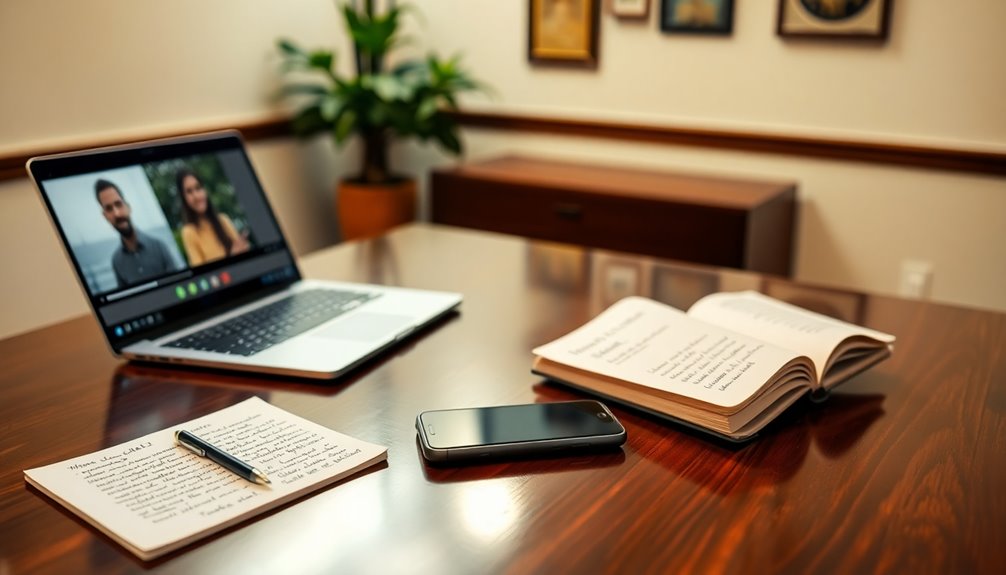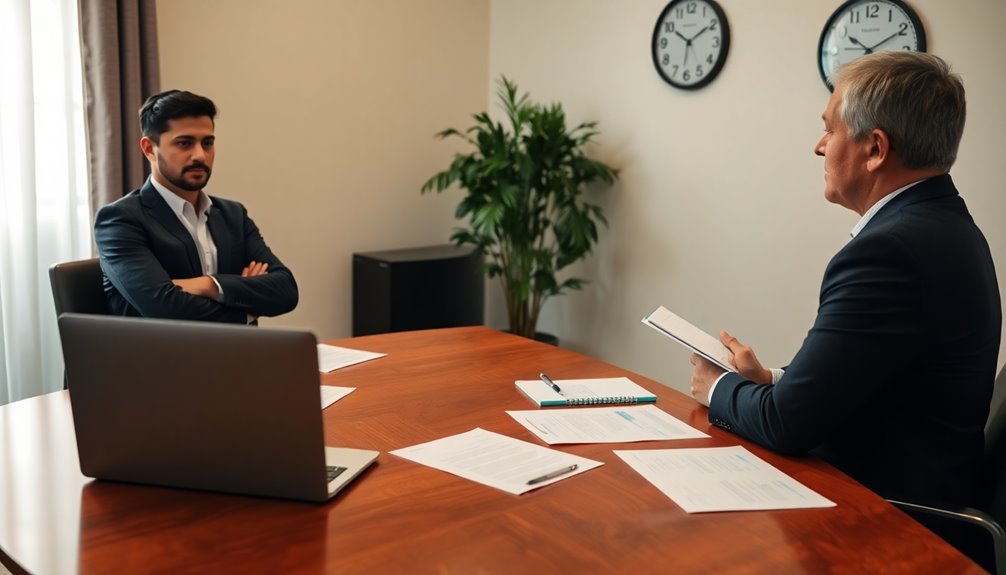Mastering diverse interview types is key to your success in landing that dream job. Start with traditional interviews by researching the company and practicing common questions. For panel or group interviews, engage all interviewers and tailor your answers to their roles. Phone and video interviews require a distraction-free environment and clear communication. Don't overlook informal chats; they help you gauge company culture. Stress and case interviews assess how you handle pressure, so practice problem-solving methods. By preparing for various styles, you'll boost your confidence and impress future employers. There's even more to explore about interview strategies ahead.
Key Takeaways
- Research the company and interviewers to tailor your responses and demonstrate genuine interest.
- Practice common interview questions to enhance confidence and articulate your strengths effectively.
- Adapt your communication style based on the interview format, whether one-on-one, panel, or informal.
- Prepare specific examples and thoughtful questions to engage interviewers and showcase your skills.
- Stay calm under pressure during stress and case interviews, demonstrating your problem-solving abilities clearly.
Understanding Traditional Interviews

When stepping into a traditional interview, you're entering a one-on-one setting with a manager or HR representative, where your credentials, education, and experience take center stage.
You'll want to research the company and the interviewer beforehand, as this knowledge can help you tailor your responses. Prepare for common interview questions, such as strengths, weaknesses, and your motivation for applying.
By practicing your answers, you'll feel more confident and articulate during the actual interview. Dress appropriately for the office or conference room setting, as first impressions matter.
Remember to engage with the interviewer through eye contact and active listening, showing that you're both interested and professional. This interview type is essential, so make every moment count.
Navigating Panel and Group Formats

Maneuvering panel and group interviews can be a unique challenge, as you're faced with multiple interviewers evaluating your fit for the role simultaneously. To succeed, you need to engage each interviewer, making eye contact and addressing their questions directly. Understanding their roles within the company can help tailor your responses.
| Key Strategies | Panel Interviews | Group Interviews |
|---|---|---|
| Address all interviewers | Focus on different perspectives | Be supportive of peers |
| Stay calm and confident | Highlight relevant experiences | Showcase teamwork skills |
| Prepare specific examples | Anticipate varied questions | Stand out with unique answers |
| Listen actively | Read group dynamics | Maintain good body language |
| Follow up with questions | Engage in dialogue | Build rapport with candidates |
Mastering Phone and Video Interviews

Mastering phone and video interviews requires a different approach than panel and group formats.
For phone interviews, find a quiet space, free from distractions, where you can focus on your voice and enthusiasm. Speak clearly and don't forget to smile, as it can enhance your tone.
In video interviews, treat it like a traditional interview—dress professionally and guarantee your background is tidy. Test your internet connection beforehand to avoid technical hiccups.
Maintain eye contact by looking at the camera, not the screen, to create a connection. Prepare to discuss your background and passion for the role, just as you'd in-person.
With practice, you'll navigate these formats confidently and effectively. Additionally, consider how emotional stress can influence your interview performance, as being aware of your feelings can enhance your composure.
Exploring Informal and Informational Options

While informal and informational interviews may seem less formal than traditional ones, they can be invaluable tools for networking and gaining insights into a company or industry. These interviews help you build connections and understand company culture. You can approach them casually, focusing on rapport rather than a strict Q&A format.
Here's a quick comparison of the two:
| Type of Interview | Purpose |
|---|---|
| Informal Interview | Build rapport and understand company values |
| Informational Interview | Gather insights about job opportunities |
| Setting | Casual environments like coffee shops |
| Structure | Less structured, conversational |
| Preparation | Formulate insightful questions |
Engaging in these interviews can open doors to opportunities you might not have considered.
Strategies for Off-Site Interviews

When preparing for an off-site interview, whether it's over a meal or coffee, it's crucial to strike the right balance between professionalism and casual conversation.
Choose a quiet venue to minimize distractions and make certain you can focus on the discussion. Opt for easy-to-eat food; messy meals can lead to awkward moments.
Arrive early to settle in and review your notes. During the conversation, maintain eye contact and engage actively to showcase your interest.
Be prepared to discuss your qualifications and experiences, but also ask insightful questions about the company culture and team dynamics.
Finally, remember to follow up with a thank-you note, reinforcing your interest and appreciation for their time.
Tackling Stress and Case Interviews

Stress and case interviews can feel intimidating, but with the right approach, you can navigate them successfully.
First, stay calm during stress interviews; remember, the goal is to assess how you handle pressure. Take a deep breath and focus on articulating your thoughts clearly.
For case interviews, familiarize yourself with common frameworks like SWOT analysis or the 4 Ps. Break down the problem methodically and communicate your thought process to the interviewer.
Practice with sample cases to build confidence. Don't hesitate to ask clarifying questions if you're unsure.
Finally, remember that it's okay to take a moment to think before responding. Your ability to remain composed and analytical will impress your interviewers.
Preparing for Behavioral Interviews

Behavioral interviews focus on your past experiences to predict how you'll handle future challenges.
To prepare, reflect on significant situations in your career where you demonstrated key skills. Use the STAR method—Situation, Task, Action, Result—to structure your responses effectively.
For instance, think about a time you resolved a conflict or led a project. Write down these examples and practice articulating them clearly.
Research the company's values and align your stories with their culture. This helps you show how your experiences make you a great fit.
Finally, rehearse with a friend or in front of a mirror to boost your confidence.
With thorough preparation, you'll navigate behavioral interviews with ease and leave a lasting impression.
Leveraging Mock and On-the-Spot Interviews

Mock and on-the-spot interviews can greatly enhance your readiness for the real thing. Engaging in mock interviews allows you to practice your responses and receive valuable feedback from friends or mentors, which builds your confidence.
Focus on refining your answers, body language, and overall presentation during these sessions.
On-the-spot interviews test your ability to think quickly and articulate your fit for a role immediately after submitting an application. To excel, familiarize yourself with common questions and practice concise, impactful responses.
Frequently Asked Questions
How Do I Follow up After an Interview?
After an interview, you should follow up with a thank-you email within 24 hours.
Express gratitude for the opportunity and briefly reiterate your interest in the position. Mention a specific point from the interview to personalize your message.
Keep it concise and professional, ensuring it reinforces your qualifications.
If you haven't heard back within a week or two, it's okay to send a polite inquiry about your application status.
What Should I Wear to an Interview?
When you prepare for an interview, you want to look professional, feel confident, and make a lasting impression.
Choose attire that reflects the company culture, whether it's formal business wear or smart casual. Opt for clean, pressed clothes, polished shoes, and minimal accessories.
Pay attention to grooming, ensuring your hair and hygiene are on point.
How Can I Handle Difficult Interview Questions?
When you face difficult interview questions, stay calm and take a moment to think before responding.
Use the STAR method to structure your answers, focusing on specific situations, tasks, actions, and results.
If you don't know an answer, it's okay to admit it and express your willingness to learn.
Practice makes perfect, so rehearse common tough questions with a friend to boost your confidence and refine your responses.
What Should I Bring to the Interview?
When you're preparing for an interview, make sure you bring essential items.
Start with several copies of your resume to share with interviewers.
Don't forget a professional portfolio containing your accomplishments and relevant work samples.
A notepad and pen can help you take notes during the conversation.
It's also smart to have a list of questions ready for the interviewer.
Finally, bring a positive attitude to leave a great impression!
How Long Should I Expect to Wait for Feedback?
You should expect to wait anywhere from a few days to a couple of weeks for feedback after an interview.
It often depends on the company's hiring process and the number of candidates they're considering.
If you haven't heard back within a week, it's perfectly fine to follow up politely.
Staying proactive shows your interest in the position and keeps you updated on their timeline.
Patience and persistence can pay off!
Conclusion
In today's competitive job market, mastering various interview types is essential for success. Did you know that 92% of employers prioritize soft skills over hard skills during interviews? This highlights the importance of showcasing your personality and adaptability, regardless of the format. By tailoring your approach and preparing effectively for each interview style, you'll not only boost your confidence but also increase your chances of landing that dream job. Embrace the challenge and stand out from the crowd!









